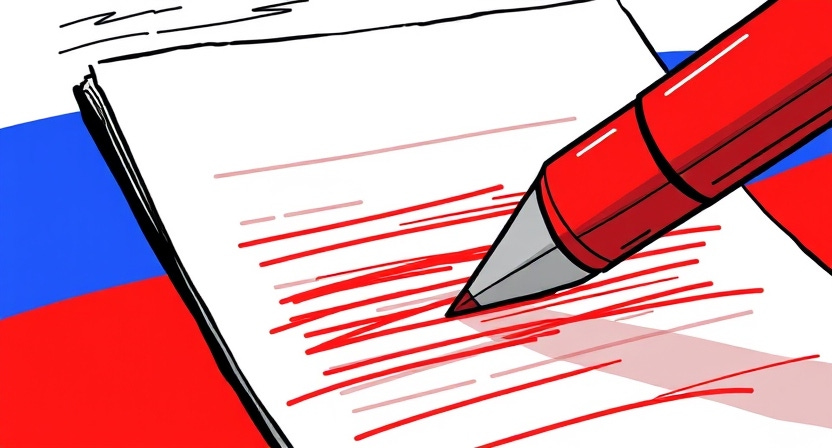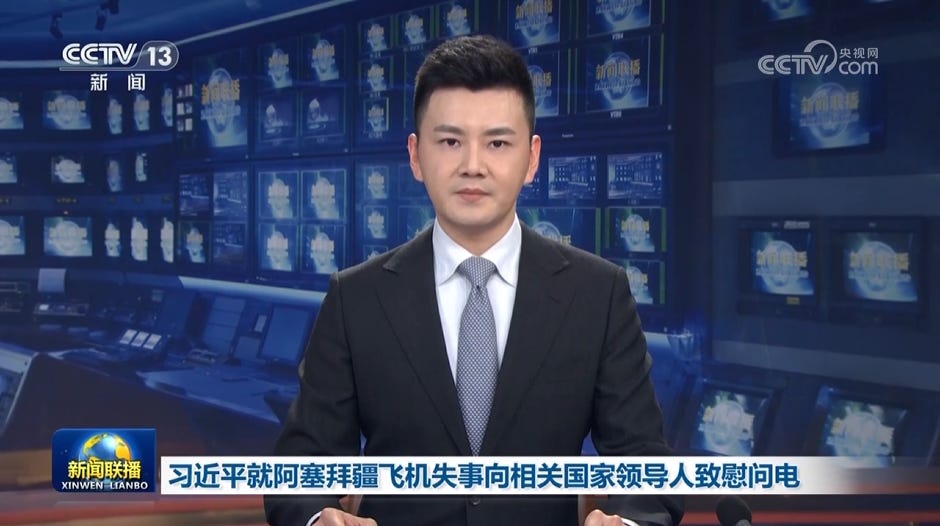Two plane crashes generate vastly different coverage in China
While state media poured over the incident in South Korea, news of the flight shot down by its ally Russia was rather more muted
Two horrific plane crashes prompted vastly different coverage in China this week, shining a light on how its state media often bends to Russian sensibilities.
On Dec 25, Azerbaijan Airlines J2-8243 crash landed just outside the city of Aktau, Kazakhstan. Of 67 people on board, 38 died. It was the second deadliest commercial plane crash of 2024.
News topped Christmas headlines and social media worldwide. Coverage particularly focused on how the aircraft had its systems jammed while attempting to land in Russia, only to then be hit by a suspected missile.
Then on Dec 29, just as the world was digesting that tragedy, Jeju Air flight 7C2216 crash landed at Muan International Airport in South Korea in an even greater loss of life. All but two of the 181 people on board have died.
Around the world, these harrowing events have topped headlines. But in China? Not so much. And not so equally.
One story has been pushed. And one story has made news writers very uncomfortable.
Muted response
China Daily has three WeChat accounts. Between them on Dec 25, they posted 31 articles. Just one was about the Azerbaijan Airline flight, in a story headed: “Passenger plane crashes in Kazakhstan”.
The linked story ran to just a single line, curt enough to be almost insulting: “According to TASS on the 25th, a passenger plane crashed near Aktau, Kazakhstan.”
In comparison, the next day, 12-times that space was given to the story of a man found dead in the wheel well of a United Airlines flight in Hawaii.
Even more newsworthy on Dec 25, China Daily deemed, was a photo of actor Li Xian posing at Yunnan's Tiger Leaping Gorge, waving a Chinese flag. "So magnificent," China Daily trilled.
The Chinese website fared better. On Dec 25, five stories about the crash were on the homepage. Yet curiously, by early on Dec 26, there was only one. Had a directive gone out to play the story down?
Check the by-lines of the China Daily, Global Times, China.org and you will also notice that media coverage of the Azerbaijan crash — as is the norm for sensitive news — were republications of Xinhua reports.
In turn, Xinhua leant heavily on Russian sources, quotes and messages. TASS, if you didn’t know, or hadn’t guessed, is Russia’s largest state-owned news agency. That very much set the theme for the next few days. Putin was featured prominently in Chinese coverage, offering sympathies, and aid.
This was very different to the rest of the world.
Within minutes of the crash, international social media was awash with footage shot by passengers from inside the stricken aircraft. Video showed punctures across the fuselage, descended air masks. Passengers reported the sound of an explosion, and being hit by shrapnel. From the crash site, yet more pictures and video of the aircraft’s exterior showed holes synonymous with a missile strike.
None of this made it into Chinese coverage.
Nor was there any mention of Malaysia Airlines Flight 17, which was accidentally shot down by Russian forces over Ukraine in 2014.
In fact, for days, China persisted with the Russian line that the plane was downed by “a bird strike”, the initial theory put out by Russia's Federal Air Transport Agency.
Only on Dec 27, when evidence was stacking up the plane had been shot from the sky, and the Azerbaijan Transport Minister cited "external interference" as the cause, did Chinese state media begin to relent.
Yet even here, not once did they suggest how this "external interference" — ‘missile’ to you and me — may have come from Russian forces. Instead, Xinhua added this paragraph to throw confusion:
“Dmitry Yadrov, head of Russia's Federal Air Transport Agency Rosaviatsiya… said that Ukrainian combat drones were carrying out attacks in the cities of Grozny and Vladikavkaz at that time.”
Then, on Dec 28, a Xinhua story ran across all foreign-facing state media: “Putin apologizes to Azerbaijani president over 'tragic incident' in Russian airspace”.
Again, not once did the article mention who had caused the “external interference”. The closest Xinhua came was a deliberately ambiguous quote from Putin: “Grozny was experiencing a Ukrainian drone attack and Russian air defense systems repelled these attacks.”
Xinwen Lianbo
The same strangely muted response could be found on Xinwen Lianbo, China’s 30 minute premier TV news programme, simulcast across the country. The first mention of the downed Azerbaijani flight came the next day on Dec 26, and (predictably) centred wholly on Xi Jinping.
“The President extends his condolences”, said the 38 second report, which featured only the host reading the teleprompter, no footage.
Russia wasn’t mentioned once in the segment. That was left until later, when an unrelated vainglorious report, lifted straight from a Russian Ministry of Defence press release told how its forces had “launched a large-scale attack on Ukraine's energy infrastructure” and “all targets were hit”. Huzzah.
On Dec 27 — even as Azerbaijan ministers were calling foul — Xinwen Lianbo showed a 36 second report insisting there was “no official conclusion yet on the cause of the plane crash”. This time there was footage of the plane’s wreckage, only it was shot from long distance, and mainly of the intact sections.
Compare this paucity to the extensive reportage of the South Korean crash, put together just hours after it happened on Dec 29.
Again, Xi Jinping got top billing, extending his condolences. Only now there followed a 1 minute 47 second segment of intense imagery: footage of the plane sliding down the runway, of the explosion, of the inferno, of bodies being recovered, of scattered belongings.
Standing at the scene, in front of smouldering wreckage, a CCTV presenter gave a blow-by-blow account of the flight’s final seconds.
This exact pattern of enhanced interest could be found across state media too.
In the 24 hours after the South Korean crash, China Daily posted 22 articles to its WeChat accounts — 12 were about the incident. Pictures. Videos. Gifs. A cacophony of morbid examination.
As I write this, there are also 12 stories currently on the homepage of the outlet’s Chinese website — more than double the initial amount about the Azerbaijan crash.
‘No limits partnership’
Is it unsurprising to see Chinese outlets take their lead from Russian sources? Or protect their larger neighbour’s reputation? Of course not.
Partly this is political. China and Russia officially exist under a “no limits” partnership, with relations at “a historic high in all respects”.
At a media level too, China and Russia have signed numerous memorandums in recent years, such as for TV content creation in March 2023, and have sought to expand “staff exchanges, joint reporting and sharing content that will be of interest to the peoples of our countries.”
Xinhua and TASS have a particularly close working relationship.
TASS Director General Andrey Kondrashov was a speaker at the 6th World Media Summit in Xinjiang, in October, where he (ironically) called for news to “uphold high professional standards, especially in the context of ongoing information wars”.
Partly, however, it is deferential. Chinese state media — particularly some of their older hands — recognise that Russia is simply better at navigating global communications. Whereas Russian media is rapid, deft, and shameless in pushing attention-grabbing disinformation, Chinese state media, are famously cautious in responding to knotty stories, and often ham-fisted in trying to deliver their narratives.
As evidence, check again Xinwen Lianbo for Dec 26.
The very next story after the first mention of the Azerbaijan crash was titled: “My country has taken new steps in building a strong transportation nation”, and celebrated the opening of the new Shanghai-Suzhou-Huzhou High Speed Railway line.
Foreign plane crash? Sparkly new China train? Clunk.
While I’m inclined to believe this hackneyed segue was an accidental comparison — railways are years in the making, no doubt this launch had long been prepped as the ‘story of the day’ — such is the Party’s basic approach to propaganda, it’s also not entirely possible to rule out that this side-by-side scheduling wasn’t a deliberate move for domestic audiences.
Xinwen Lianbo tends to follow a very established running order: Xi Wise; Domestic Good; Foreign Scary.
It’s crude, but the message is thumpingly clear: overseas is dangerous. Stay in the Party’s loving embrace.
Into this framework, it was always going to be hard to incorporate the politically-sensitive Azerbaijan plane crash, without embarrassing its Russian ally. So mostly, the Party has sought to do what it tends with awkward stories: ignore it as much as possible.
No doubt, a hard memo went out from the Publicity Department to media outlets last week, ordering them to ‘not hype the story’, stick to Xinhua reporting, turn off comments — I saw many of those in my time. That would explain the muted response after an initial flurry.
For the South Korean crash, it’s been the opposite.
Shorn of political complexities, and with the incident taking place in a nation where relations are hostile to frosty, state media have been free to wallow in every morbid detail of this newest crash. Coverage is a mix of part horror; part schadenfreude; part intensity due its proximity; and part releasing of all the pent up rubbernecking outlets were censored from doing last week.
One final observation.
It’s noticeable that until Putin apologised for the Azerbaijan Airlines incident, China was still pushing the “bird strike” theory domestically. One wonders if Putin’s apology blindsided state media somewhat, who had — until then — been faithfully maintaining Russia’s initial line.
Under normal circumstances, this would be an embarrassing volte-face.
Yet the moment Jeju Air flight 7C2216 skidded off the Muan runway, Chinese media were delivered an opportunity to save face, move on. Stunning revelations aside, I’ll be surprised if we ever hear of the Azerbaijan flight again in Chinese media. Moscow too will be sighing relief.
Simply put: ‘No limits’ means some stories are more newsworthy than others.





FWIW, the Taiwanese media (especially television news) covered the South Korean crash extensively but had little coverage of one in Azerbaijan.
I'm pretty sure the Taiwanese focus on South Korea had little to do with PRC sensibilities. Taiwan and South Korea are cousins. There was a lot concern about whether a crash like this might occur in Taiwan. Taiwanese tourists visit South Korea frequently. Jeju is a popular destination. It seems to me that Taiwanese were naturally interested in this topic that occured in the neighborhood. Azerbaijan is a distant country that few Taiwanese have heard of let alone visited.
I'm really enjoying your writing here.
Correction: The cause of the plane crash in Azerbaijan is still unknown, but is likely a bird strike.
Portions of the cockpit voice recorder have now been released, and features the pilots talking about a bird strike.
It seems that at least in this case, Chinese media got it more correct than Western journalists, who immediately started to run with a spurious shoot-down narrative.